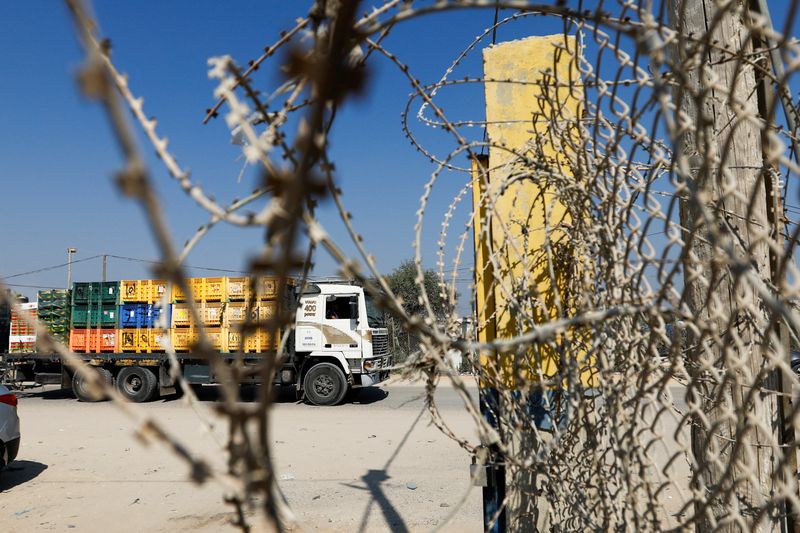Israeli ban on Gaza exports deals blow to long-suffering economy
2023.09.05 09:08
5/5

© Reuters. A view of Palestinian goods trucks in front of the commercial crossing of Kerem Shalom after the Israeli ban on Gaza exports deals a blow to the long-suffering economy, in Rafah in the southern Gaza Strip September 5, 2023. REUTERS/Ibraheem Abu Mustafa
2/5
By Nidal al-Mughrabi
GAZA (Reuters) – Palestinians demanded on Tuesday that Israel lift a ban on exports from the Gaza Strip imposed over what Israel called an attempt to smuggle explosives, saying it would hit thousands of families and ruin precarious livelihoods in the blockaded enclave.
Israel said on Monday it was temporarily stopping commercial goods from leaving Gaza after inspectors found several kilograms of “high-quality explosives” in a shipment, hidden in the lining of clothes.
At the beachfront Al-Bahar (The Sailor) restaurant and fish farm, owner Mohammad Al-Hajj said he used to export 20 tons of fish per week to Israel and the West Bank.
“The fish in fridges will decay if we can’t export it, and we will be forced to sell the fish of the farm at the lowest prices,” said Hajj, saying the jobs of 200 workers at his business were at risk unless the ban is lifted.
Around 2 million Palestinians live in the narrow Gaza Strip, the vast majority of them descendants of refugees who fled or were driven from what is now Israel at its founding in 1948.
Since the Hamas Islamist group took power in the territory in 2007, it has suffered from the one of the world’s highest unemployment rates under a blockade of many goods imposed by Israel with Egyptian backing. It has also been severely damaged in four major wars and numerous other clashes between Hamas and Israel.
Hamas spokesman Hazem Qassem said the Israeli decision “would increase the already existing tension because of continued Israeli blockade and aggression against our people”.
In Ramallah, in the Israeli-occupied West Bank, Palestinian economy minister Khaled Assaili demanded Israel cancel the ban which stops Gaza exports to Israel and the West Bank.
The unjust decision added to a policy of collective punishment adopted by Israel since 2007 that had caused a humanitarian crisis in Gaza, said Assaili, who is part of the Palestinian Authority that claims to represent all Palestinians although it lost control of Gaza to Hamas.
Gaza exports are estimated at $134 million per year, mostly to Israel and the West Bank, according to the enclave’s ministry of economy.
The Hamas-run agriculture ministry in Gaza said the Israeli move would impact 60,000 families of farmers and fishermen. It estimated daily losses at one million shekels ($263,000).
“We demand the unjust decision be retracted. It isn’t based on any real justification and it violates the international law using fragile pretexts,” the ministry said in a statement.
Despite its blockade, Israel allows thousands of workers to leave Gaza to work in Israel and the West Bank, and maintains customs posts to allow exports in a bid to foster a certain level of economic stability.
As well as fish and agricultural produce, Gaza exports significant quantities of textiles and other products.
Osama Nofal, an official in Gaza’s economy ministry, said the border closure would have wider effects beyond the immediate freeze on exports.
“The decision will impact industrial installations, close them, and may lay off many workers and increase unemployment. Such a decision is purely catastrophic,” he said.
Wadhah Bseisso, spokesman of the Palestinian Industries Union, said as many as 30,000 jobs could be lost if the shutdown continued.
(Reporting and writing by Nidal Almughrabi; Editing by Peter Graff)








